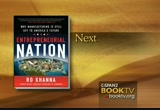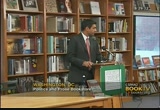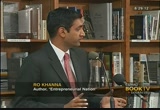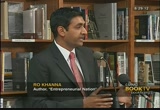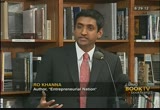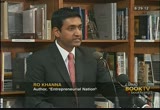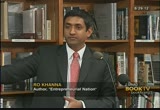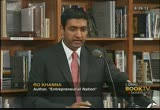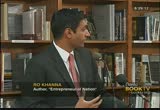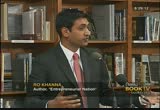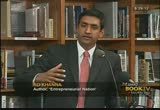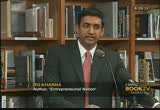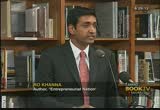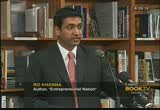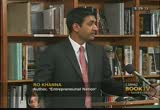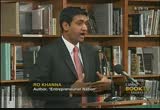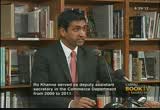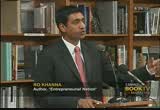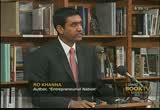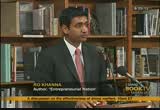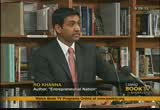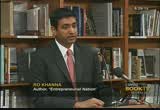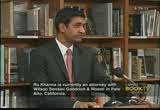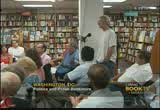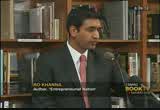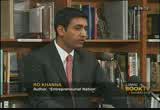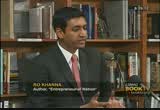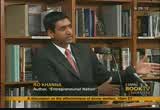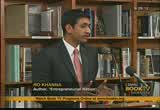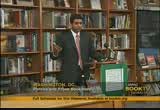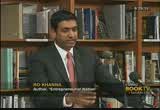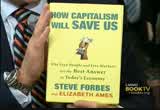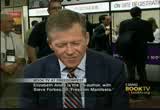tv Book TV CSPAN September 15, 2012 9:00am-10:00am EDT
9:01 am
>> next and booktv ro khanna legal assistant deputy -- dubya secretary of commerce argues the u.s. is and will continue to be a leader in at manufacturing and innovation. it is about 45 minutes. >> thank you. thank you for the very kind introduction. a real honor to be at politics and prose. such an institution to the city
9:02 am
and the pleasure to be here. thank you for coming out on an august evening to hear me. i will try to be brief in my comments and i have more of an exchange of ideas and your perspective so i can have a conversation about manufacturing and what the country should do to be competitive. the idea for the book came about when i was traveling around the country and i would see a successful manufacturer making lenders, making steel, making meat and food and i would say i thought our manufacturing had gone off shore. something didn't make sense. i started to wonder what were people missing in the story and it turns out that while a lot of consumer manufacturing has gone
9:03 am
off shore or if you go into a store, the toys and apparel, a lot of that has left america, we are still a world leader when it comes to complex advanced manufacturing. we make almost 80% of steel here, we make a tremendous amount of planes here and we are neck-and-neck in manufacturing with china. that is a staggering statistic. we make 20% of the world's goods with about 10% of our economy. china makes 20% of the world's goods with 40% of the economy so we are neck-and-neck with the manufacturer due to six times productivity advantage that we enjoyed over china when it comes to manufacturing. we have a productivity advantage over country like japan and
9:04 am
germany which are thought of as manufacturing leaders so i started asking myself what is it that gives us this productivity advantage? what gives american manufacturers this ability to compete? and i wanted to go and talk to real manufacturers because one of the things when you are in washington and in these bureaucracies you get a lot of people pontificating about the state of american manufacturing and what we need to do without actually engaging and talking to manufacturers and particularly not talking to small medium-sized manufacturers. large manufacturers, often represented in policy think tanks but the reality is almost half the manufacturing jobs are with small and medium-sized businesses. i decided i wanted to talk to these small and medium-sized businesses to find out what was giving them a comparative
9:05 am
advantage and one argument i make in the book is our entrepreneurial culture allows us to have a productivity advantage. by that i don't mean simply the on for for door at the top, steve jobs and mark zuckerberg model or the great industrialists. what i mean is companies that do well in the manufacturing space listen to the ideas of their employees and are encouraging their employees to come up with efficiency in production to figure out how to assemble things more efficiently, how to make products that are more innovative than they are soliciting those ideas and this is where a lot of conditional critique of manufacturing missed the mark. robert wright who makes the argument that there is -- people like lawyers in my profession and doctors and bankers who are
9:06 am
knowledge workers and vendors and manufacturers completely missed the idea of modern manufacturing. it requires a lot of knowledge. these are people who are thinkers who are innovating and lawyers require a lot of repetitive work. somehow lawyers draft documents and it is repetitive. there is a distinction that is artificial and the best manufacturers that i match were listening. let me give you two concrete examples. talked about 15 in the book. i was shocked to learn that blunders that make your cappuccinos are all made for the most part in the united states. when i first learned that i learned i am paying $4 but when i discovered -- i talked to a
9:07 am
brilliant woman about why is it you are allowed -- able to make splendors in the united states and sell them to specialty coffee shops. jody explained the specialty coffee shops have very specified requirements for what they want out of their blenders. they don't want any noise. you go to a bunch and noble or chain stores and they have the starbucks fare and they're making noise and won't wonder and go into the stores. they want to make sure there is no noise in the blenders. secondly for those who enjoyed cappuccino you know you don't want ice chips so make sure the blenders actually crushed the ice chips properly. so what jody was able to do was actually work with the specialty coffee shops on the design of
9:08 am
the blunders they wanted and that is a difficult process to outsource. you can imagine if you were in china or brazil trying to figure out how to design something and interacting with them would be very complicated. the customization of products that allow a small and medium-sized manufacturers know is inherently possible to do in the united states and it wasn't just jody engage in this. it was her employees who were coming up with ideas how to make a blunder better. second example is a globe staff manufacturing. globe was one of the most inspiring stories in the book. it is a manufacturing since -- after 9/11 when the pentagon was attacked and they needed fire companies to put out the fire,
9:09 am
they had different companies from the virginia ariane and the d.c. area and only those using globe fire systems were able to work through the night and deal with the pathogens and extremities in the pentagon building. one of the people the commanders at the pentagon called up rob freeze, he said we need 300 here tomorrow. what is the size? don't know. just figure out how to get them there. so this small company in new hampshire, 300 people assembled these fire suits. he was about to take the mercy flight after 9/11. he delivered these and use them to put out the fire in the pentagon. the story of patriotism is more than that. what allows fire suits to have
9:10 am
these advantages? one of the biggest insights came in a production each fission see. they were able to make fire systems much cheaper than foreign competitors and the idea i go into detail about in the book came from one of the employees on the assembly line who said if you use a smaller size neil data smaller size needle will make smaller holes and it will save fabric and costs and this was an idea that was submitted in a suggestion box that led to a lot of innovation and it shows a culture of listening to employees loathsome -- the second part that was unique was the way they would innovate sensors and the type of equipment on fire suits that help fight the extremities didn't come from ph.d.
9:11 am
scientists. the guy who was doing a lot of tinkering didn't even have a college degree so often there's a sense that we need stem education and we do but we shouldn't underestimate the sense of practical skills often passed down from generation's war that people acquired doing things on the factory floor that accounts for a lot of the most successful innovation. one of the pieces, democratic culture in the business world gives us a competitive advantage over more authoritarian manufacturing structures particularly small and medium businesses because it allows them to economize production and customize products. the second thesis in the book is tracing support of manufacturing
9:12 am
back in american history. the idea that there has always been a role for government support of private industry going all the way back to alexander hamilton. i tell people you don't have to read the world is flat to understand what we need to do in the competitive world. you can read alexander hamilton's report on manufacturing. in makes almost the identical arguments. in a world where we are competitive with other nations and other nations setting up industries we need to make sure -- we need to make sure we are providing incentive for the personal economic incentives for new industries. and justification for funding through hamilton's argument. hamilton makes the argument we
9:13 am
need infrastructure and road that support manufacturing and the argument that we need the right tax incentives and the right work force that is educated and even jefferson who was on the other side comes around to the view that the government needs to support manufacturing. this becomes the american economic system and influences abraham lincoln and is the governing philosophy of america's rise in industrialization. herbert hoover when i got to the commerce department wondered why would you name the commerce building after the president responsible for the depression? not to be trey my partisan leanings. i developed a lot of respect for hoover. he was not the best president but he was a great commerce secretary. they called herbert hoover the secretary of commerce and undersecretary of everything else and he was working for
9:14 am
calvin coolidge. herbert hoover believed in the american economic system and he and calvin coolidge, the apostle of limited government ordered billions of dollars to set up the aviation industry. in wichita, funded the existence of infrastructure and calvin coolidge talks about the importance of investment in roads and eisenhower and even ronald reagan invested and fed of the semiconductors and the manufacturing partnership which some people think is irrelevant would be a brainchild of reagan so what has happened. in the last 30 years there has been the sense that government no longer should matter among some people with certain
9:15 am
ideologies. they argue that america should not make the mistake of becoming like europe. the irony is who they cite for their philosophy are great american thinkers like ayn rand. the intellectual justification for free-market absolutism is not found in american history because alexander hamilton believed in free markets but practical politicians need to realize there are times to intervene. we have been a nation when it comes to manufacturing that rejected the ideology of the left and the right and really done what works and that through the book i try to advance the argument and the person who sums it up the best is columnist richard mcgregor from the
9:16 am
financial times. america's problem is not that it does not work like china. america's problem that it no longer works like america. what mcgregor means by that is we don't need to copy a system of government in china or brazil's that has accepted state intervention but we need to remember policies that helped make us a great industrial power. those policies hopefully can be adopted on a bipartisan basis like they were until our most recent history and most recent turn to free market absolutism. there's a practical middle ground. we could get into policies during q and a. the question that often comes up is what is the hope for the
9:17 am
future? what is the sense of american manufacturing, american economy with the rise of china, the rise of brazil or other developing nations? one of the points i make is our nation has consistently been underestimated would comes to our economy. in the 1915s and larry summers made this point in an article, how many have heard of paul samuelson? wrote the standard textbook where he argues if the growth rates continue as they were the soviet union would overtake the united states by 1985. a lot of other things were brilliant but that turned out to
9:18 am
be incorrect. cover article after cover article in the harvard business review predicted america win the cold war but japan and germany will be the dominant post cold war economy. those predictions seem rather silly in retrospect. fit is not to diminish the contributions of the skeptics. the greatness of our nation is at times of crisis, at times where things may not be -- the skeptics say we may lose and force us to reexamine our policies that allow us to adapt and continue to lead. the same principle is true right now. manufacturers particularly small
9:19 am
and medium-sized manufacturers are doing extraordinarily innovative things. customizing product. economizing production. they are competing. we are neck in neck with china but the growth rates are not promising. china is growing at 1%. the last nation the losses lead in manufacturing, can anyone guess? great britain. things did not work out well for them afterwards. we are faced with a challenge and the challenge is not our american entrepreneurs up to it but are they going to get on a bipartisan basis the support of their government that has existed for 200 year tradition. the argument i make is we need to come together as a nation on national security basis and a sense of economic competitiveness to put together
9:20 am
manufacturing agenda that will help these manufacturers and continue to thrive in an environment where they are not getting the assistance of the government and other foreign competitors are getting extraordinary assistance from their government. let me end on the note where i am most optimistic and i don't talk about this fully in the book but coming from silicon valley, you see the existence of technology companies and technology advantage and linkedin and all these companies emerging in the united states and what they represent and the technology future of the united states represents is the ability to not just export and export our products but to export our ideals. democratic dialogue, freefall of
9:21 am
information, and the ability of these technology companies that still based in the united states to have a global impact bodes well not just for our economic future but the ability of america to continue to project its ideals across the world to democratize the flow of information which i argue is fundamental to much of our productivity and competitive advantage. thank you and with that i will answer any questions. [applause] >> i am not sure -- i wanted to ask about what you foresee in the future of manufacturing and manufacturing itself changes. there may be less assembly lines and more widespread if computer manufacturing and how will our
9:22 am
entrepreneurial advantage continue to persevere in that environment? >> excellent question. what will the role of technology for american manufacturing. the first thing i caution people about its technology is not going to replace workers, fully replace workers. and technology is progressing at such a great rate that in 20 years we are all going to be working 15 hour work weeks. that turned out to be completely false because what it didn't account for is the demand for goods will increase. would have fought back in the 1930s that anyone would need an iphone. automation reduced the need of workers on particular goods but the output increased so much that we were able to have more
9:23 am
need. that said, what technology enables with things like additive printing and robotics is the ability to continue to have a productivity advantage and e efficiency advantage over competitors and the challenge in my judgment for the united states workforce is how to prepare people to be able to use these machines, to be able to -- conversant with computers and technology and that is why the investment in technology and the internet and broadband and training people on that is absolutely critical to our future and specific types of
9:24 am
education. not diminishing the skills these jobs require. my law school classmates will tell you i was completely inept at making anything and ironic i wrote a book on manufacturing. i can go right a brief. i can't assemble a cnc machine. that doesn't mean my skill is different. it is not any better. it may have its own market value but we have frowned upon or don't appreciate the complexity of the skills required in the trades. i think we need to educate technology and also have real respect for how difficult some of these jobs are. >> you just mentioned the importance of sustaining our efforts at technology oriented education. which of our other current
9:25 am
manufacturing facilitation initiatives do you think are really critical for us to sustain and what new initiatives would you suggest in order to continue to stimulate our entrepreneurial success? >> great question. the manufacturing extension partnership is a small program but it is not well known. at the department of commerce and what they do is they help companies figure out how to become more efficient. they help companies figure out how to economize on their production process or to customize products or how they can find a path to profitability. why can't you privatize? why can't you just have a consultant to do that? the answer to that is after ge you can pay mackenzie rates or bain rates but not if you are a small or medium-sized
9:26 am
manufacturers struggling to make ends meet and you want help on how to compete. even alexander hamilton thought manufacturers need help in becoming conversant with new technologies. the manufacturing partnership which has been underfunded and has not been deployed should be supported and other countries have five times the helpy provide manufacturers. exports. only 1% of our companies currently exports. it is a staggering statistic and it is not just opening markets abroad. it is also having cultural familiarity and desire to go abroad and having programs that can help manufacturers identify foreign markets and resources is critical. you have to look at trade and
9:27 am
tax policy. no doubt in my mind that china's policies are unfair. not just to american workers. they are unfair to their own middle-class. they are supporting the leech exporters with crony relationships with the regime at the expense of giving their own access to the best products in the world. we need to make economic fairness the highest priority in our bilateral relationships with china and on tax policy we have to look at how do we incentivize manufacturers with the right tax credits to invest in united states. thank you. >> my question is focused on exports. i was wondering about obama's export initiative which says
9:28 am
exports should be doubled by 2014. >> i didn't plant this question. >> i was just wondering first of all what do we export and what are the strengths and what do you think can be done by the government or other institutions in order to promote the export so the goal can be reached? >> great question. one of the things we exports is planes. we export machinery. complex machinery. we export medical equipment. people are often shocked to learn -- you know what most people get? they guess weapons and that is not true. we are more idealistic. weapons exports are far lower than planes and machinery and complex equipment when it comes to manufacturing. what are the challenges?
9:29 am
exports under this administration are up 32% over it the last two or three years. that is not just because of the president's leaders of the he deserves credit. it is also because we're coming out of a huge depression and some of the currency factors into it. what beacon to concrete leak in my judgment is one is education. we need to have manufacturers take exports seriously. use to be having an international division was a nice novelty. if they fall in your lap that is great that people felt the vast majority of markets were in the united states. the world has changed. 95% of consumers are overseas and we need companies to realize that and have international sales as a core part of their strategy.
9:30 am
second is access to financing or tax incentives. one of the challenges when i was in wichita, they said their competition was getting financed by the brazilian government. when they were going to sell stuff it was like the brazilian government gave the money. they had no access to financing here. may be politically controversial and president clinton has proposed taking deepak chopra money and financing manufacturers but even if we are not directly loading companies money, what we can do is provide the right tax incentives that if they are willing to export or manufacture they have those incentives. the final point is there is an awful lot in the world trade organization that allows countries that have indirect taxation. the value added tax to exempt their exporters from that
9:31 am
taxation. if you have the corporate tax like we do, we are not allowed to exempt our manufacturers from that tax. we established the world trade organization at a time when we didn't think anyone was going to compete so we wanted to encourage other countries to build industry but the world has changed and on a bipartisan basis we need to push for a change in those wtos between indirect and direct taxation when it comes to tax credits for exporters. >> if you have come across companies that do export in your research? >> absolutely. i talk about a number of them and one company i talked-about was tucker powder in alabama and they export can be all over the world and i describe alabama as an example that you don't have
9:32 am
to be on the coast to be successful at exporting and one of the reviews said we do have a big porch in alabama so they took exception with that but the point is even their powder is extraordinary. going on trade fairs, trade missions. they are aggressive about seeing where all their candy can be sold and they are successful example. numerous examples. the chilean miners. the drilling rigs that save those lives remain in pennsylvania. i talked-about their story and how they exported their drilling rigs to the world. the reality is consumers around the world people want american goods because they tend often to be the best. the most innovative and it is our job in government to open the markets because that is good
9:33 am
for american business and people around the world with access to american technology and american business will see the opportunity to recognize there is still a cash to make things made in america. >> the other side that you mentioned, the idea of exporting ideas and my question is how is that done? what do you propose to set up a way to spread the ideas around world? >> great question. i don't know how -- in the time of communism, talking to one of my colleagues about this idea earlier there was a voice of radio and we used to have american values to transmit through radio and leaders who were allies of ours espousing
9:34 am
american ideals and we saw ourselves as the shining city on the hill and hoped we could spread those ideas. once the internet does -- the novel idea of the internet is it provides people with the tools and access to information where they can discover this on their own and fighting to make sure there is not censorship of the internet and the free flow of information, are dealt with is one way we can encourage open discussion of the personal free discussion of ideas. so my bullishness on the american model spreading in the twenty-first century partly because of this tool the internet which makes everyone
9:35 am
able to speak, assembled leaders expressed themselves which are some of the founding principles of this country. >> my question is complicated and simpler. explained very well that america is entrepreneur developing new ideas which still is. i don't think we are lacking anything in that but afterwards i don't understand once we have that we develop copycats' like china and anything we develop that they can do easier and cheaper. how can we do that? how can we do that? he took the jobs out to china.
9:36 am
that is the competition we have in china. that is how we give ideas -- taxation or something to do something. that is the most difficult part. entrepreneurship. >> the question is how can we keep mass production here when the cost advantages are tremendous in places like china. one fax is labor costs are only 10% of the product's cost. a lot more goes into it. there is the subsidy when they get free land and free rent. it is the currency issue. there are several encouraging signs rising in china slowly. transportation costs and fuel
9:37 am
costs increased with natural gas in the united states, manufacturing cost and coming down so the equations is a little more balanced. in the case of apple they do prototype manufacturing here. they have to integrate, design production to make the new iphone. they do that stuff here but they off shore mass production and that is the biggest challenge for the united states how to get mass production back. most of the company's i focus on are either smaller medium-sized businesses making niche products or interesting customized product where you can't mess produce it. you can't offshore to china or they are constantly saying at the front of the innovation curve. one company i deal with, china
9:38 am
saying they will give them the old technology to satisfy the joint venture agreement as long as they don't give them their newest latest technology so giving them intellectual property that is anything but the most recent. the pressure on the united states will be to continually stay ahead of the innovation curve until we can get fair trade qualities in places like china. >> every american's responsibility that they should be able to buy the goods if we are to train the public for that. martin luther king's statute -- can you believe it was made in china? something so close to you and the flags you get made in china. how can you change that
9:39 am
industry? >> there is a local manufacturing moment in many cities when you see people wanting to buy from their local stores for environmental reasons for supporting local business so there is a cultural aspect. we also have to get the economic support. and we have to have the right economic incentives to sustain manufacturing long term. >> just introduced the concept -- seems to me there are two forces that are opposing what you would like to achieve and one of them is the rise in the last 40 years of finance people in large corporations. the finance people replaced manufacturing people in leadership so the people who lead the corporations are not the engineers that used to make
9:40 am
things. they are the finance people with growth in the economy in the finance sector and the incentive here seem always the most recent egregious example of that in the financial crisis and experiences are too big to fail and to the biggest banks, thanks too big to fail and bigger. how do you oppose this? these are the most powerful forces in the economy? >> an excellent question. i don't remember it off the top of my head but in the book i think a third of harvard graduates are going in to finance and the undergraduate class and there are not that
9:41 am
many people currently going into manufacturing. there's a misperception in the country about how many good paying manufacturing jobs are still available land manufacturing jobs pay 20% more on average than service sector jobs even when you combine the finance industry. we have to do a better job articulating the opportunities that exist in the manufacturing sector because there's so much misinformation about manufacturing having gone off shore and manufacturing being environmentally unsafe and we have to recognize leaders in manufacturing. one of the things this book does is try to hold these people who are making things up has a model of something that should be
9:42 am
celebrated. a lot of these manufacturers are obviously running businesses and want to be profitable but that is not what was motivating them. they have the pride of making something meaningful and dedicated their lives to that and the more we can extol their story through microphone. i tried to do in the book, political leaders that the media does it and hold them up as role models. as a cultured people will see those are careers worth going into. in terms of the financial sector i don't think we can dismiss the financial sector and there are economists who point out in service exports america actually has a surplus. if you look at china we have a $6 billion surplus when it comes exporting services and the deficit in manufacturing.
9:43 am
the finance done correctly which is figuring out how to match capital with good ideas is important and having complex innovation is healthy for america's system. the problem is short-term thinking where companies come in and bankrupt companies for short-term gain instead of thinking would is viable long-term model, long term rate of return? that has to do with corporate governance laws and figuring out how we can have incentives and structures that don't require that incentivize managers to make long-term decisions instead of maximizing quarterly shareholder profit. >> did you see any of these incentives to emphasize small misread the than bigness? >> absolutely. the program helps small and
9:44 am
medium-size businesses. 50% of jobs in manufacturing are small and medium-sized companies and small companies have the advantage because they are doing things they can't afford automation or making niche products and rooted in their communities and the reason i am so passionate against some of these attacks on commerce is some people say we can't eliminate all of that. that is government assistance. the people who need government help where they're subsidizing multinational corporations are precisely the small and medium-size businesses. there are a number of programs across the government that are designed to help small medium-sized businesses, mafacturing extension and export promotion agencies and a number that i described in the book.
9:45 am
funding them and coming to a bipartisan consensus we need to work with some of them can go one step in offsetting the disadvantage competing with large companies. >> in the absence of bipartisan agreement and leadership and the things you want government to do it seems the tax code has become an instrument for encouraging or aiding american manufacturing and private sector interests. so what is the appropriate role of the tax code? an efficient way to do things? how would you transform this? >> great question. there are two tax policy ideas i discuss in the book. one is repatriation which involved companies that have money offshore allowing them to bring it back to the united
9:46 am
states with the condition that they invest in capital equipment in the united states and expand the work force. we tried repatriation in 2004 and companies brought back the money and it went to shareholders and there was no actual investment in expansion in capital equipment or expansion of the workforce. having a compromise where you allow companies to repatriate the money not at the 35% tax rate but maybe 10% to 12%, tie that with actual metrics of expanding the work force or investment in the united states is something worth looking at. i am sympathetic to president obama's proposal for a tax credit for companies that bring manufacturing back or invest in the united states in communities and create jobs and propose 20%
9:47 am
tax credit for those companies. people say why don't you cut the corporate tax rates across the board and my argument is i don't think right now with our deficit that either my law firm or investment banks or wall street need a corporate tax cut. let's target corporate tax cuts to areas that are engines of economic growth. i am sympathetic to tax incentives if they can be tied to accountability for companies to actually invest in communities and create jobs. next question. >> talking about tax incentives. on the other side, won't it be ok to analyze -- not quite the right word. to tax the imports to discourage
9:48 am
discourages encourages local manufacturing? >> that is a big debate how much protection we should have as a country. my view is if the competition is fair i think americans can compete with any goods and we should not discourage competition. healthy competition. the problem is what happens if the competition is unfair? i talked-about but story of solynd which is a political football. everyone says the department of energy -- why did solyndra failed? one of the things is the untold story, main reason it failed is the chinese dumping solar panels. when solyndra started chinese solar panels were at a much higher price and explicitly dumped those solar panels into
9:49 am
the united states and undercut the solyndra solar panels. practice like that which is market distorting, the united states should act firmly in duties to impose and say that this is not acceptable. we have to look at it on a case by case basis. steel price is another great example i write about in the book. bilateral negotiation between the chinese and the united states and complaining about the duties reimposed and one of our senior officials asked chinese counterparts how many american steel companies in china. the answer was zero. we allow five chinese companies to operate in the united states. we need to use our trade policy to incentivize countries like
9:50 am
china to open their markets and play by the same rules but what we shouldn't do is have protectionism that is simply designed to aid manufacturers against fair and healthy competition. [applause] >> thank you. >> you are watching booktv on c-span2. forty-eight hours of nonfiction authors and books every weekend. >> you are watching booktv on c-span2. next weekend down here on the national mall the national book festival will be taking place. this will be the twelfth annual. booktv will be live on c-span2 but if you are in theory and want to stop by and gravel booktv that come and see us by the history and biography tent. here on booktv on c-span2 we want to introduce you to offer
9:51 am
elizabeth ames who has written a book with book with steve capitalism will save us: why free people and free markets are the best answer in today's economy". first of all tell us about yourself and your personal experience particularly when it comes to economics. >> i have been a financial journalist but also on both sides of the press release so i started as a journalist. by headed my own pr business and also done projects, other communications projects for clients among them this, offering book and basically i worked with steve forbes and conversations led to the idea for this book. >> how did you meet steve forbes? >> i met him at an event i did when working at the university of southern california. one thing led to another.
9:52 am
i moved to new york. i am from new york and started working at forbes in the pr department. >> your practical experience prior to working at forbes. how do you inject that into "how capitalism will save us"? >> i have learned a lot since forbes and about markets and i was a journalist and began as a journalist and worked at in business week many years ago as a journalist. when i started to work as an entrepreneur i learned about the fact that you need to have economic freedom to create jobs. something i've learned personally and if you are just getting a paycheck you don't understand how government can affect small business and job creation and i experienced that firsthand. that is one of the things that led me to think this could be a useful idea for a book.
9:53 am
>> philosophically how do you see the role of government? the role of congress? the role of the president in the economy? >> this book raises and answers the question. we need government to create a stable environment for businesses to function and create jobs. when government meddles too much into the economy government and its decisions and policies are driven by politics and markets are driven by the desire of the individuals and companies to meet the real world needs of people and that is the difference between what government does and what markets do. you need government to protect us from fraud. there are wrongdoers and government can protect us from them but overly meddlesome government goes too far and you end up depressing enterprise and
9:54 am
innovation and job creation. >> host: the 2008 financial situation and so-called bailout. are you supportive of that government intervention? >> basically you could see that as a an emergency intervention. if government had gotten out that would have been fine. unfortunately they stayed too long. the comparison we make is to katrina. there is emergency aid and then people get back on their feet. the government used the financial crisis as an excuse to expand itself and expand control of the economy. >> host: ask what point would you say the government should have stepped out? >> guest: they didn't allow banks that wanted to pay back
9:55 am
the money, papermaking it difficult. they made them cheapest and tried to force it on banks that didn't want to tank bailout in the first place. some people have argued with the fact we make this point that the bailout was necessary. they went too far. may use the financial crisis as an excuse to overregulate. >> we are interviewing u.s. freedomfest. do you find a lot of opposition to that idea? some of the ideas in this book? >> people are very -- that is what this event is about. about free people and free markets and people understand what is in this book. all ideas that you best serve the needs of people by free enterprise. what is free enterprise?
9:56 am
people trying to meet their own needs and the needs of others and that is what people understand. they understand entrepreneur real business and you create jobs and not through government but through innovation. innovation has created the most jobs. did government invent the automobile? no. >> host: what is it like to write a book with steve forbes? >> guest: a great learning experience. almost like higher education. >> guest: one of the themes we have been talking about is the moralism of capitalism. is there a moral component to capitalism? >> guest: yes and that is the subject of the next book at the end of the month.
9:57 am
capitalism is immoral because it is about meeting real world needs of other people. free market transaction is a reciprocal exchange. each person provides benefits to the other. each side gives to the other. really great on wealth and poverty. people who believe in big government see a free market transaction, there is exploitation and it is not about that. each side gets benefits. it may not be ideal, there is benefit -- it is in a free market. that is what makes it to both sides. unilateral transaction takes
9:58 am
place between the individual and government. >> host: was your enthusiasm for mitt romney as a candidate? >> guest: i think he will be a very good president. he is saying things here. >> host: you mentioned the new book coming out. >> guest: freedom manifesto. big government isn't. >> host: another book co-written by you and steve forbes. >> guest: we got it over here. [talking over each other] >> host: we want to show you the current book. how capitalism will save us. the new book by elizabeth ames and steve forbes, freedom manifesto and the sub head,
9:59 am
subtitle. >> guest: why free-market tomorrow and the government isn't. big government makes decisions, takes action based on political agenda ofs, based on selfish political interests. it is about meeting its own political selfish needs and free markets are meeting real world needs of people. >> host: as someone who follows economics and formal financial journalist and somebody has opinions on this issue, bernie madoff, jamie dimon, were those two treated fairly by the federal government? >> bernie madoff was treated fairly. i would not put them in the same breath. bernie madoff got what he needed to get. i think of him as the serial killer of capitalism. you don't condemn a whole
139 Views
IN COLLECTIONS
CSPAN2 Television Archive
Television Archive  Television Archive News Search Service
Television Archive News Search Service 
Uploaded by TV Archive on

 Live Music Archive
Live Music Archive Librivox Free Audio
Librivox Free Audio Metropolitan Museum
Metropolitan Museum Cleveland Museum of Art
Cleveland Museum of Art Internet Arcade
Internet Arcade Console Living Room
Console Living Room Books to Borrow
Books to Borrow Open Library
Open Library TV News
TV News Understanding 9/11
Understanding 9/11
